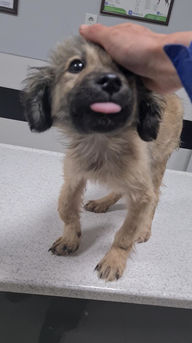MEDITERRANEAN DISEASES AND PREVENTION
In 2024, thanks to your donations, we provided 200 vaccinations, 50 neuters, 8 major surgeries, and treated 13 distemper patients. Want to help us continue our work, donate here
Prevention is Better Than Cure
Of course, in our hearts, we would love to bring every shelter dog to a forever home and find them a loving family. And naturally, we try to heal every sick dog. But we also know that this is not always a sustainable solution. In the long run, prevention is just as important as cure.
Neglect in Turkey
Lisanne, who single-handedly runs the Turkish shelter, encounters new cases of neglect almost daily. Proper pet care is not yet common practice in Turkey. Many people let their dogs roam the streets unsupervised, providing little to no care. No neutering/spaying, no vaccinations, no parasite treatment. Even if a dog is hit by a car, many people do not take them to the vet. It is also common for people to buy a puppy, sometimes as a gift for their children, and then abandon it on the streets when they no longer want it.
Prevention in the Shelter
For the stray dogs taken in by the shelter, the focus is on prevention as much as possible. In Mediterranean regions, ticks, mosquitoes, and sandflies transmit dangerous diseases such as leishmaniasis, ehrlichiosis, and heartworm. For each dog, we seek a sponsor who can cover disease prevention costs for a year. Click here for more information on our sponsorship program. Thanks to sponsors all our dogs can be vaccinated, dewormed, and treated with anti-parasite pipettes.
This will reduce future medical costs, increase adoption chances, and significantly improve the dogs' welfare. We also focus heavily on neutering and spaying. This not only prevents unwanted puppies and kittens but also reduces the spread of sexually transmitted diseases and minimizes tensions between dogs.
Medical Care
Prevention alone is not enough to care for more than 70 dogs. The shelter is always in need of blankets, towels, medicine, and funds for surgeries for injured animals. You can donate dog items here.
A Future Without Neglect
While we strive to find homes for as many dogs as possible, we know that true change comes from addressing the root of the problem. Prevention, education, and community involvement are key to building a future where dogs are not abandoned, neglected, or suffering. With your help, we can make a lasting impact. Click here if you want to support our cause.








Mediterranean Diseases
Dogs from Turkey and other Mediterranean countries may carry diseases that are not common in the Netherlands due to differences in climate and the absence of certain parasites. All dogs adopted through us are tested for leishmania, ehrlichia, and filaria (heartworm) before they are ready to fly. We recommend retesting about nine months after adoption and staying vigilant for symptoms, even if initial tests were negative. Puppies can be reliably tested from six months of age. If a puppy is younger at the time of adoption, we advise testing 6–9 months later.
Filaria (Heartworm)
Heartworm (Dirofilaria immitis) is a parasite that settles in the heart and pulmonary arteries. It is transmitted by mosquitoes and is common in Mediterranean regions. Heartworm can lead to serious heart problems. In the early stages, there are often no symptoms, but as the worms mature, they can cause:
-
Poor condition
-
Coughing
-
Weight loss
-
Low blood pressure
-
Fainting and collapse
-
Fluid accumulation in the abdomen
-
In severe cases, death
A blood test can diagnose heartworm by detecting adult female worms. However, it takes 5–7 months after infection for the worms to mature, meaning an initial negative test is not 100% reliable. To be certain, a follow-up test 6–12 months after adoption is recommended. Heartworm is treatable if caught early, but advanced infections can be fatal.
Leishmania
Leishmania, caused by the Leishmania infantum parasite, is transmitted by sandflies, which do not exist in the Netherlands but are common in Mediterranean areas. Some dogs never develop symptoms, while others become severely ill or even die. The disease cannot be cured, but with medication, it can usually be managed effectively. Symptoms include:
-
Lethargy, weight loss, fever, poor appetite, bloody stools/diarrhea, vomiting, pale gums
-
Skin problems, often around the face and ears
-
Enlarged lymph nodes, nosebleeds, lameness
-
Kidney disease, which can range from mild protein loss to severe kidney failure
-
Eye problems, such as eyelid and corneal inflammation
Dogs are tested for Leishmania antibodies before adoption. A negative test means no active infection at the time of testing, but the parasite can remain dormant for years. Therefore, symptoms can appear long after adoption.
Ehrlichiosis
Ehrlichiosis is caused by the Ehrlichia parasite, transmitted by certain ticks not found in the Netherlands. Some dogs carry the parasite without symptoms, while others become sick, even years later. Symptoms may include:
-
Lethargy
-
Mild weight loss
-
Poor appetite
-
Anemia (low red blood cell count), low white blood cells, or low platelets
-
Increased bleeding tendency (e.g., nosebleeds, blood in urine/stool, skin bruising)
-
Poor kidney function
After infection, a dog produces antibodies against Ehrlichia, but it can take 7–28 days for them to appear in a blood test. The parasite can remain in the dog’s body for life, and symptoms can develop years later.







